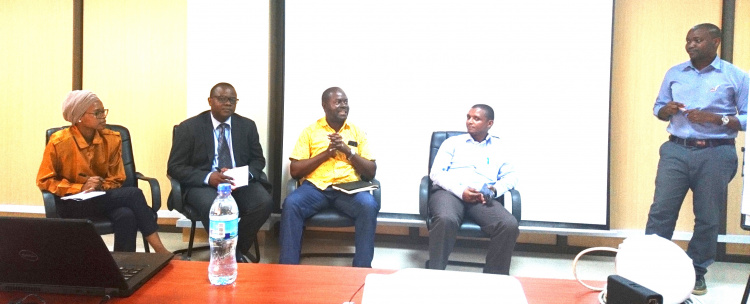DigI:TZ-Sustainability SchoolConnectivity Feb2020
From its-wiki.no
Revision as of 22:50, 3 March 2020 by Josef.Noll (Talk | contribs)
| Digital Inclusion (DigI) | |||||||
|---|---|---|---|---|---|---|---|
|
DigI:TZ-Sustainability SchoolConnectivity Feb2020
| Title | Sustainability in School Connectivity-Feb2020 |
|---|---|
| Place | MUHAS@DarEsSalaam |
| Date, Time | 2020/02/27, 10:30-12:30 |
| Contact Person | Catherine R. Kimambo, Felix Sukums |
| Participants | Asanali Msangi, Joseph Bishi, Catherine R. Kimambo, Felix Sukums, Eden Wanyimba, Rashid Ally, Felix Sukums, Matogoro Jabera, Joseph Bishi, Christine Holst, Julius Peter, Peter Mmbando |
| related to Project | DigI |
| Keywords |
| this page was created by Special:FormEdit/Meeting, and can be edited by Special:FormEdit/Meeting/DigI:TZ-Sustainability SchoolConnectivity Feb2020 |
| Category:Meeting |
Objectives
Panel Discussion on Approaches, Challenges, and Sustainability of Community Networks and School Connectifity. Including contributions from Governmental representatives addressing sustainability in school connectivity
Main Take-away
During the panel and the discussion we reached to a common understanding of the success sustainable school/community connectivity. UCSAF (Universal Communication Service Access Fund) supports school connectivity and is inviting to a proof-of-concept involving 10 schools. Main conclusions were:
- OPEX costs need to be affordable for the local communities/schools. It has to be ensured that the OPEX costs can be covered locally, thus a target of max 20 USD/month is envisaged for rural areas. If there is a certain demand, then access solutions with higher costs can be considered.
- The Internet need to be centred around people and need to answer the needs of the local communities. Main goal should be to empower the society, including content hosted locally.
- Both inclusion of policy makers and policies to ease the roll-out of community networks are essential for the success of digital inclusion. Community networks find their role in areas where mobile operators don't see a viable business model.
Venue
The meeting took place at MUHAS@DarEsSalaam in the MUHAS Harvard Room at MUHAS HD-CHPE Building, 2nd Floor. The workshop was part of the DigI Hackathon.
Participants
- MUHAS: Felix, Asanali, Nyoni
- African Child/Basic Internet TZ: Catherine, Ben
- UDESO: Eden Wanyimba
- BOACSE: Rashid Ally
- Joseph Bishi (Zimbabwe)
- Univ Dodoma: Matogoro Jabera, n.n., n.n.
- University of Oslo/Basic Internet: Christine, Josef, Brenda
- Kenya - AHERI: Barrack, Robert
- UCSAF: Albert Richard
- Internet Society: Peter Mmbando
Agenda Sustainable School Connectivity Workshop
- 10:30 Welcome (Felix)
- 10:45 The "National Knowledge Portal" for Tanzania (3 min video - https://owncloud.basicinternet.org/index.php/s/gfyTAbyhLifvyja)
- 10:50 Knowledge uptake from Digital Content (Christine Holst) (10' + 5')
- 11:05 Connecting Schools, Health Stations and Communities (participants)
- reports from DigI projects in collaboration with communities
- 11:30 School connectivity pilot (Vodacom & UCSAF)
- 11:45 Affordability and Sustainability in School connectivity (Catherine R. Kimambo)
- 12:00 Panel on School/village/primary Health facilities -
- 12:25 Conclusions and Action Items (Catherine/Juliana)
- 12:30 End of workshop

